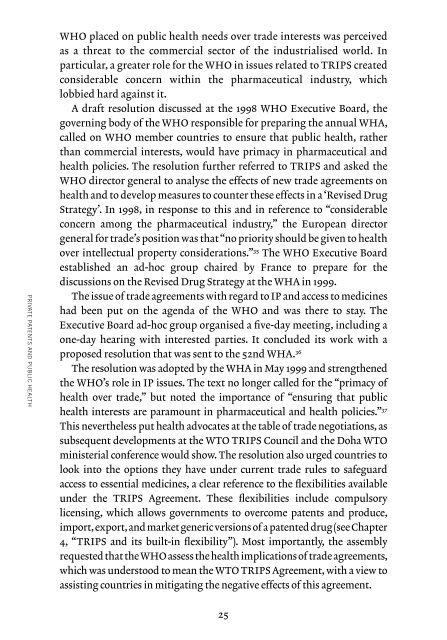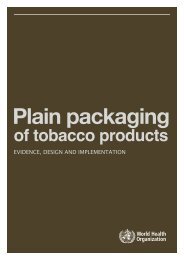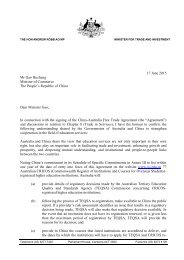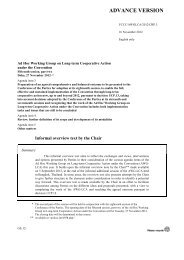PRIVATE PATENTS AND PUBLIC HEALTH
private-patents-and-public-health
private-patents-and-public-health
Create successful ePaper yourself
Turn your PDF publications into a flip-book with our unique Google optimized e-Paper software.
<strong>PRIVATE</strong> <strong>PATENTS</strong> <strong>AND</strong> <strong>PUBLIC</strong> <strong>HEALTH</strong><br />
WHO placed on public health needs over trade interests was perceived<br />
as a threat to the commercial sector of the industrialised world. In<br />
particular, a greater role for the WHO in issues related to TRIPS created<br />
considerable concern within the pharmaceutical industry, which<br />
lobbied hard against it.<br />
A draft resolution discussed at the 1998 WHO Executive Board, the<br />
governing body of the WHO responsible for preparing the annual WHA,<br />
called on WHO member countries to ensure that public health, rather<br />
than commercial interests, would have primacy in pharmaceutical and<br />
health policies. The resolution further referred to TRIPS and asked the<br />
WHO director general to analyse the effects of new trade agreements on<br />
health and to develop measures to counter these effects in a ‘Revised Drug<br />
Strategy’. In 1998, in response to this and in reference to “considerable<br />
concern among the pharmaceutical industry,” the European director<br />
general for trade’s position was that “no priority should be given to health<br />
over intellectual property considerations.” 35 The WHO Executive Board<br />
established an ad-hoc group chaired by France to prepare for the<br />
discussions on the Revised Drug Strategy at the WHA in 1999.<br />
The issue of trade agreements with regard to IP and access to medicines<br />
had been put on the agenda of the WHO and was there to stay. The<br />
Executive Board ad-hoc group organised a five-day meeting, including a<br />
one-day hearing with interested parties. It concluded its work with a<br />
proposed resolution that was sent to the 52nd WHA. 36<br />
The resolution was adopted by the WHA in May 1999 and strengthened<br />
the WHO’s role in IP issues. The text no longer called for the “primacy of<br />
health over trade,” but noted the importance of “ensuring that public<br />
health interests are paramount in pharmaceutical and health policies.” 37<br />
This nevertheless put health advocates at the table of trade negotiations, as<br />
subsequent developments at the WTO TRIPS Council and the Doha WTO<br />
ministerial conference would show. The resolution also urged countries to<br />
look into the options they have under current trade rules to safeguard<br />
access to essential medicines, a clear reference to the flexibilities available<br />
under the TRIPS Agreement. These flexibilities include compulsory<br />
licensing, which allows governments to overcome patents and produce,<br />
import, export, and market generic versions of a patented drug (see Chapter<br />
4, “TRIPS and its built-in flexibility”). Most importantly, the assembly<br />
requested that the WHO assess the health implications of trade agreements,<br />
which was understood to mean the WTO TRIPS Agreement, with a view to<br />
assisting countries in mitigating the negative effects of this agreement.<br />
25






